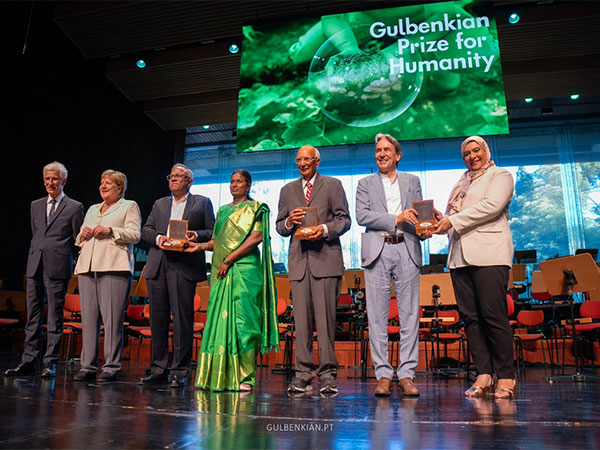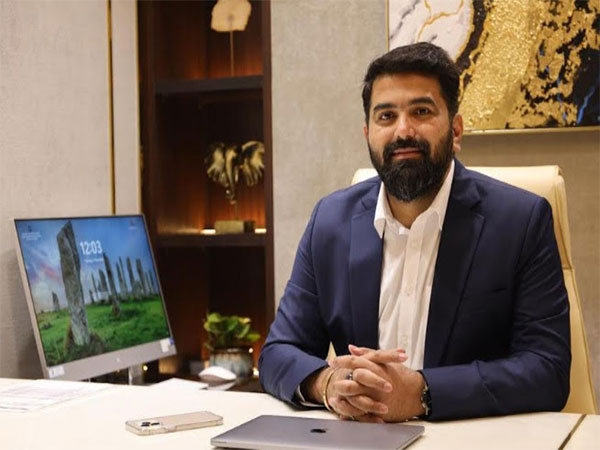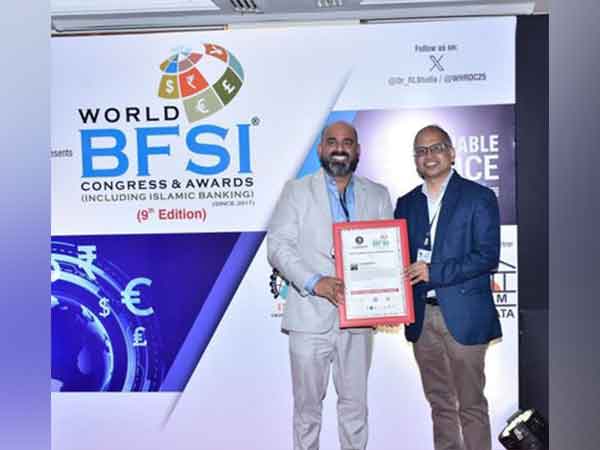The Andhra Pradesh Community Managed Natural Farming (APCNF) Wins the Gulbenkian Prize for Humanity 2024
Jul 12, 2024
BusinessWire India
Lisbon [Portugal]/ Guntur (Andhra Pradesh) [India], July 12: The Andhra Pradesh Community Managed Natural Farming (APCNF) program, led by the Government of Andhra Pradesh, has been awarded the prestigious Gulbenkian Prize for Humanity 2024. The announcement was made by Dr. Angela Merkel, chair of the Jury and former Federal Chancellor of Germany, during a ceremony in Lisbon, Portugal on July 11th. The event was attended by dignitaries including the President of Portugal and other government officials, alongside experts from around the world.
APCNF shares the EUR1 million prize with Dr. Rattan Lal, a renowned soil scientist from the USA, and SEKEM, an Egyptian network promoting biodynamic farming. The Jury and the Calouste Gulbenkian Foundation recognized their collaborative efforts in advancing sustainable agriculture through both scientific research and practical applications. The prize money will support scaling their initiatives and fostering further sustainable agriculture projects globally.
The Andhra Pradesh Community Managed Natural Farming (APCNF), a state-wide program of the Government of Andhra Pradesh, has been recognized for its significant contributions to global food security, climate resilience, and ecosystem protection. This initiative specifically supports smallholder farmers, with a focus on empowering predominantly women farmers.
The Calouste Gulbenkian Foundation, among the world's largest philanthropies, has acknowledged the significance of sustainable agriculture solutions through the 2024 Gulbenkian Prize for Humanity. Awarding EUR1 million, the Prize honours exceptional contributions to climate action and solutions that inspire optimism and potential. Instituted in 2020 by the Calouste Gulbenkian Foundation (CGF), previous recipients include notable figures like climate youth activist Greta Thunberg, and organizations such as the Intergovernmental Panel on Climate Change (IPCC) and the Intergovernmental Science-Policy Platform on Biodiversity and Ecosystem Services (IPBES). This marks the first occasion the award has been bestowed in India.
The independent jury of the Prize for Humanity, chaired by Dr. Angela Merkel (former Chancellor of Germany), has chosen the 2024 winners from over 181 nominations worldwide. This year saw the highest number of nominations received by the Foundation, spanning more geographies than ever before. The 2024 Prize emphasizes the interconnected nature of climate-related challenges, highlighting how they lead to systemic crises. Climate change is worsening biodiversity loss, extreme weather events, and resource degradation, which in turn disrupt global food systems and human health. Additionally, agriculture plays a significant role in climate change through carbon emissions, land and water degradation, and biodiversity loss.
The Andhra Pradesh Community Managed Natural Farming (APCNF) programme was launched in 2016 by the Government of Andhra Pradesh to support smallholder farmers in transitioning from chemically intensive agriculture to natural farming. This transition includes practices such as using organic residues, minimizing tillage to improve soil health, reintroducing indigenous seeds, and diversifying crops, including trees. APCNF is implemented by the Rythu Sadhikara Samstha (RySS), also known as the Farmers Empowerment Corporation, a non-profit entity established by the Government of Andhra Pradesh. It is recognized as the world's largest agroecology programme in terms of the number of practicing farmers.
Over a million smallholder farmers are enrolled in the APCNF programme, practicing natural farming across 500,000 hectares in Andhra Pradesh. The programme offers farmers reduced costs, reduced risks, stable yields, improved incomes, and health benefits from the very first season of transition. It generates significant environmental and social benefits, including greater soil carbon sequestration, reversing land degradation, reducing soil temperatures, and increasing biodiversity.
The success of APCNF relies on four key levers:
1. Delivery through an established network of women collectives.
2. Farmer-to-farmer learning via 'Champion Farmers'.
3. A dynamic technology blend of the best Indian practices, modern science, and ongoing farmer innovations.
4. Strong government ownership.
The APCNF programme aims to reach all eight million farmer and farm worker households in Andhra Pradesh over the next 10 years and inspire replication elsewhere. The model is already being incubated in 12 states across India and will be introduced in a few countries in the Global South in 2024, adapted to their local contexts.
The award was received by Vijay Kumar Thallam, Executive Vice Chairman of RySS and Advisor to the Government of Andhra Pradesh, and Mrs. Nagendramma Nettem, a Champion Farmer Coach from APCNF.
Upon receiving the Prize, T. Vijay Kumar shared in his winning speech: "This award gives HOPE to everyone in the world that there is a very powerful and 'ready to use' solution for the climate emergency. Together, we have learned that farming in harmony with nature can reverse climate change; farmers can improve their livelihoods and their health while healing the planet; and women collectives hold the key to scaling this powerful solution. Therefore, investing in farmers and women collectives is critical for building a better life on planet Earth."
"On behalf of the Government of Andhra Pradesh, I am happy to announce that the entire prize money received from this award will be used for the global scaling of natural farming. The Government of Andhra Pradesh has decided to utilize the prize payment to create a structured technical assistance model for APCNF to share its knowledge, expertise, and skills on natural farming with more countries in the Global South, thereby incubating the natural farming model across many countries."
Angela Merkel, President of the Jury, says: "Access to high-quality food is of existential importance to everyone. Climate change and the resulting global warming have led to an increase in extreme weather events and are endangering food security around the world. This presents everyone engaged in the agriculture sphere with particular challenges. This year's winners have demonstrated in an exemplary fashion how climate-resilient and sustainable food systems can be developed and put into practice."
Antonio Feijo, President of the Board of Trustees of the Calouste Gulbenkian Foundation, says: "We are honoured to recognize the recipients for their pioneering work in sustainable agriculture and offering innovative solutions to global food security, climate resilience, and ecosystem protection. Each winner has demonstrated exceptional commitment to transforming agricultural practices, proving that sustainable models can thrive in diverse and challenging environments. Their work also demonstrates the co-benefits of sustainable agriculture for communities as well as the planet. We believe their stories will inspire others to apply similar approaches in other regions and help us build a sustainable future for all."
The Prize is an initiative of the Calouste Gulbenkian Foundation, rewarding individuals and organizations who are leading society's efforts to tackle the biggest challenges facing humanity today: climate change and nature loss. With an award of EUR1 million, the Prize recognizes outstanding contributions to climate action and solutions that inspire hope and possibility.
In the history of the Prize awarded by the Calouste Gulbenkian Foundation:
* 2020: Awarded to Greta Thunberg.
* 2021: Awarded to the Global Covenant of Mayors for Climate and Energy.
* 2022: Jointly awarded to the Intergovernmental Science-Policy Platform on Biodiversity and Ecosystem Services (IPBES) and the Intergovernmental Panel on Climate Change (IPCC).
* 2023: Jointly awarded to Bandi "Apai Janggut" (customary community leader, Indonesia), Cecile Bibiane Ndjebet (activist and agronomist, Cameroon), and Lelia Wanick Salgado (environmentalist, designer, and scenographer, Brazil).
Budithi Rajsekhar, Special Chief Secretary of the Agriculture, Sericulture, Co-operation, Marketing, Agriculture & Co-operation Department, Government of Andhra Pradesh, said:
"I am elated to hear that the Andhra Pradesh Community Managed Natural Farming Programme has won the prestigious Gulbenkian Prize for Humanity 2024 award. This historic moment is a salute to the 8.5 million women's Self Help Groups mobilized across Andhra Pradesh over the last 25 years, that formed the backbone of the launch of APCNF. I am also grateful to the Honorable Chief Minister and all my colleagues at the Government of Andhra Pradesh who propelled the APCNF model over the last 9 years.
On behalf of the Government of Andhra Pradesh (GoAP) and Rythu Sadhikara Samstha (RySS), I want to extend my sincere gratitude to the Gulbenkian Foundation and the esteemed jury of the Gulbenkian Prize for Humanity for selecting the Andhra Pradesh Community Managed Natural Farming (APCNF) as the joint winner of this year's prize. What makes this prize even more special for APCNF is that we are honored to share it with two esteemed experts doing pathbreaking work in regenerative agriculture - SEKEM and Dr. Rattan Lal. Warm congratulations from us to both of them."
The Gulbenkian Prize for Humanity prize money will be used by APCNF towards accelerating our efforts to transition all 8 million farmers and farm workers in Andhra Pradesh, inspiring a national effort for the transformation of 120 million farmers across India, and promoting better South-South cooperation to address the climate emergency. This initiative aims to improve farmers' livelihoods and enhance global food and nutrition security.
(ADVERTORIAL DISCLAIMER: The above press release has been provided by BusinessWire India. ANI will not be responsible in any way for the content of the same)








